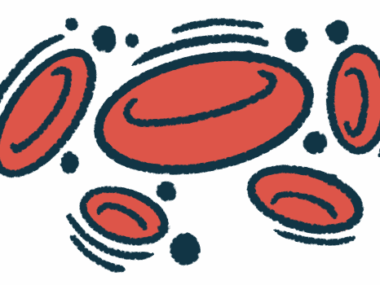Ruxoprubart treatment for PNH found effective in trial: Data
Standalone therapy helped untreated patients avoid blood transfusions
Written by |

Novelmed Therapeutics’ ruxoprubart prevented red blood cell destruction in treatment-naïve adults with paroxysmal nocturnal hemoglobinuria (PNH), allowing these untreated patients to avoid blood transfusions altogether.
That’s according to 12-week interim data from an ongoing Phase 2 clinical trial (NCT05646524), which showed that the PNH treatment, when administered as a standalone therapy, was safe, well-tolerated, and met all primary efficacy outcome measures.
According to the company, these data will support the filing of a regulatory application seeking permission to launch a Phase 3 trial to confirm the findings.
“The promising interim results from our Phase [2] PNH study solidify ruxoprubart as a novel treatment for patients with advanced hematological conditions, offering hope where existing therapies fall short,” Rekha Bansal, PhD, Novelmed’s CEO, said in a company press release outlining the data findings.
“We are eager to present our findings to regulatory authorities and proceed with the Phase [3] trial,” Bansal said.
Developer to seek FDA breakthrough therapy designation
In PNH, the abnormal activation of a group of immune proteins called the complement system leads to the destruction of healthy blood cells, particularly oxygen-carrying red blood cells. This triggers PNH symptoms such as shortness of breath, fatigue, and blood in the urine.
Many approved PNH treatments prevent blood cell destruction by inhibiting the activation of two distinct complement pathways: the classical and the alternative pathways. However, medications that suppress both pathways have been seen to increase the risk of life-threatening infections.
Ruxoprubart, previously known as NM8074, is designed to block a protein called Bb, which is part of the alternative complement pathway that is the main driver of blood cell destruction in PNH. By leaving the classical pathway unaffected, the therapy is expected to keep the disease under control while reducing the risks of infection associated with current treatments.
The U.S. Food and Drug Administration (FDA) recently granted ruxoprubart orphan drug status, a designation meant to incentivize pharmaceutical companies to develop treatments for rare diseases. The company is planning to file a request asking the agency to grant ruxoprubart breakthrough therapy designation, which is also meant to accelerate the development and FDA review of therapies aimed at treating serious conditions.
Data from a Phase 1 study (NCT05642546) showed ruxoprubart was safe, well tolerated, and completely blocked the alternative pathway in a dose-dependent manner. Building on these findings, Novelmed launched the Phase 2 study with 12 adults with PNH who had never been treated.
Half of the participants received 20 mg/kg of ruxoprubart, given as an intravenous, or into-the-vein, infusion every two weeks. The other half received a dose of 10 mg/kg each week for the first four weeks, followed by 20 mg/kg every other week. So far, 10 patients have completed the study, while the remaining two have been enrolled to complete the trial.
Ruxoprubart treatment met all efficacy measures in PNH trial
Treatment with ruxoprubart met all efficacy measures, according to the researchers — protecting red blood cells from being destroyed, and allowing study participants to be free of blood transfusions.
At the same time, it boosted the levels of hemoglobin, the protein in red blood cells that carries oxygen, by 1.4 grams to 2 grams per deciliter (g/dL) in most patients, with some showing increases of 1.5 to 4.3 g/dL. Across all patients, average hemoglobin levels rose by at least 1.6 g/dL from the study’s start.
Ruxoprubart also lowered the levels of lactate dehydrogenase, a marker of red blood cell destruction, and enabled patients to recover from infections as expected, per the company.
“We are excited to announce that our alternative pathway strategy for treating PNH is delivering exceptional results,” said Alex Kumar, chief strategy adviser at Novelmed. “These data reinforce our confidence as we look forward to working with the regulatory agency to bring ruxoprubart to PNH patients without delay.”
The therapy was safe and well-tolerated in all treated PNH patients, with no reported side effects, according to Novelmed.
The company is now also conducting two Phase 2 clinical trials (NCT05731050 and NCT05646563) testing ruxoprubart in PNH patients who have previously been treated with Soliris (eculizumab), the first complement-blocking therapy approved for PNH.
Our mission is to transform the lives of chronically ill patients for whom an ideal treatment has yet to be discovered.
Regulators recently approved a once-weekly subcutaneous (under-the-skin) protocol for ruxoprubart, allowing self-administration of the PNH treatment. According to the developer, this will offer a “distinct advantage” over other therapies that require twice-weekly dosing.
Novelmed also is developing ruxoprubart for several other complement-mediated disorders, specifically ANCA vasculitis and atypical hemolytic uremic syndrome.
“Our mission is to transform the lives of chronically ill patients for whom an ideal treatment has yet to be discovered,” Kumar said.







